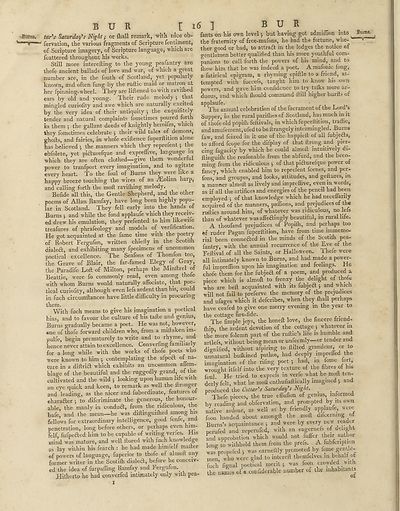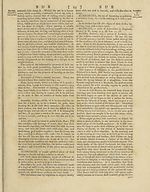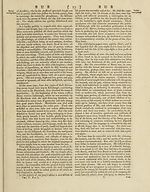Encyclopaedia Britannica, or, a Dictionary of arts, sciences, and miscellaneous literature : enlarged and improved. Illustrated with nearly six hundred engravings > Volume 5, BUR-CHI
(26) Page 16
Download files
Complete book:
Individual page:
Thumbnail gallery: Grid view | List view

Bums.
BUR [i
tar's Saturday's Night; or ihall remark, with nice ob-
fervation, the various fragments of Scripture fentiment,
of Scripture imagery, of Scripture language, which are
fcattered throughout his works.
Still more interefting to the young peafantry are
thofe ancient ballads of love and war, of which a great
number are, in the fouth of Scotland, yet popularly
known, and often fung by the ruftic maid or matron at
her fpinning-wheel. They are liftened to with ravifhed
ears by old and young. rlheir rude melody •, that
mingled curioiity and awe which are naturally excited
by the very idea of their antiquity j the exquilitely
tender and natural complaints fometimes poured forth
in them j the gallant deeds of knightly heroifm, which
they fometimes celebrate 5 their wild tales of demons,
gholts, and fairies, in whofe exiflence fuperltition alone
has believed } the manners which they reprefent 5 the
obfolete, yet pidturefque and exprefluve, language in
which they are often clothed—give them wonderful
power to tranfport every imagination, and to agitate
every heart. To the foul of Burns they were like a
happy breeze touching the wires of an TEolian harp,
and calling forth the molt ravifhing melody.
Befide all this, the Gentle Shepherd, and the other
poems of Allan Ramfay, have long been highly popu¬
lar in Scotland. They fell early into the hands of
Burns $ and while the fond applaufe w hich they receiv¬
ed drew his emulation, they prefented to him likewife
treafures of phrafeology and models of verfification.
He got acquainted at the fame time wdth the poetry
of Robert Fergufon, written chiefly in the Scotifh
dialed, and exhibiting many fpecimens of uncommon
poetical excellence. The Seafons of Thomfon too,
the Grave of Blair, the far-famed Elegy of Gray,
the Paradife Loft of Milton, perhaps the Minftrel of
Beattie, were fo commonly read, even among thofe
with whom Burns wamld naturally affociate, that poe¬
tical curiofity, although even lefs ardent than his, could
in fuch circumftances have little difficulty in procuring
them. . .
With fuch means to give his imagination a poetical
bias, and to favour the culture of his tafte and genius,
Burns gradually became a poet. He w as not, however,
one of thofe forward children who, from a miftaken im-
pulfe, begin prematurely to wrrite and to rhyme,. and
hence never attain to excellence. Converfmg familiai iy
for a long while with the works of thofe poets who
wrere known to him ; contemplating the afped of na¬
ture in a diftrid which exhibits an uncommon aftern-
blage of the beautiful and the ruggedly grand, of the
cultivated and the wild } looking upon human life with
an eye quick and keen, to remark as well the ftronger
and leading, as the nicer and fubordinate, features ol
eharader j to difcriminate the generous, the honour¬
able, the manly in condud, from the ridiculous, the
bafe, and the mean—he was diftinguifhed among his
fellows for extraordinary intelligence, good fenfe, and
penetration, long before others, or perhaps even him-
felf fufpeded him to be capable of writing veries. His
mind was mature, and well ftored with fuch knowledge
as lay within his fearch : he had made himfelf mailer
of powers of language, fuperior to thofe of almoft any
former writer in the Scotifh dialed, before he conceiv¬
ed the idea of furpafling Ramfay.and Fergufon..
Hitherto he had converfed intimately only with pea-
6 ] BUR
fants on his own level j but having got admiflion into
the fraternity of free-mafons, he had the fortune, whe¬
ther good or bad, to attrad in the lodges the notice of
gentlemen better qualified than his more youthful com¬
panions to call forth the powers of his mind, .and to
fhow him that he was indeed a poet. A mafonic long,
a fatirical epigram, a rhyming epiftle to a friend, at¬
tempted with fuccefs, taught him to know his own
powers, and gave him confidence to try talks more ar¬
duous, and which Ihould command ftill higher burfts of
applaufe.
The annual celebration of the facrament of the Lord s
Supper, in the rural parillies of Scotland, has much m it
of thofe old popifti feftivals, in which fuperftition, traffic,
and amufement,ufed to be ftrangely intermingled. Burns
facv, and feized in it one of the happieft ol all fubjeds,
to afford fcope for the difplay of that ftrong and pier¬
cing fagaeity by which he could almoft intuitively di-
ftinguilh the reafonable from the abfurd, and the beco¬
ming from the ridiculous j of that pidurelque power of
fancy, which enabled him to reprefent feenes, and per-
fons, and groupes, and looks, attitudes, and geftures, in
a manner almoft as lively and impreflive, even in v ords,
as if all the artifices and energies of the pencil had been
employed j of that knowledge which he had neceffarily
acquired of the manners, paffions, and.prejudices of the
ruftics around him, of whatever w as ridiculous, no lefs
than of whatever was affedingly beautiful, in rural life.
A thoufand prejudices of Popifti, and perhaps too
«f ruder Pagan fuperftition, have from time immemo¬
rial been conne&ed in the minds of the Scotifti pea¬
fantry, with the annual recurrence of the Eve of the
Feftival of all the Saints, or Halloween. Thefe were
all intimately known to. Burns, and had made a power¬
ful impreflion upon his imagination and feelings. He
chofe them for the fubjed of a poem, and produced a
piece which is almoft to frenzy the delight of thole
who are beft acquainted with its fubjeft j and. which
will not fail to preferve the memory of the prejudices
and ufages which it deferibes,.when they (hall perhaps
have ceafed to give one merry evening m the year to
the cottage fire-fide. .. ,
The Ample joys, the honeft love, the fincere Inend-
ftiip, the ardent devotion of the cottage.-, whatever m
the more folemn part of the ruftic’s life is humble and
artlefs, without being mean or unfeemly—or tender and
dignified, without afpiring to ftilted grandeur, or to
unnatural bufldned pathos, had deeply impreffed the
imagination of the rifing poet -, had, m lome fort,
wrought itfelf into the very texture of the fibres of his
foul He tried to exprefs in verfe what he moft ten¬
derly felt, what he moft enthufiaftically imagined 5 and
produced the Cottar's Saturday's Night. . .
Thefe pieces, the true effufion of genius, informed
by reading and obfervation, and prompted by its own
native ardour, as well as by friendly applaufe., were
foon handed about amongft the moft difcermng of
Burns’s acquaintance -, and were by every new reader
uerufed and reperufed, with an eagernefs of delight
and approbation which would not iuffer their author
long to withhold them from the prefs. A fubfcription
was propofed > was earneftly promoted by lome gentle¬
men w ho were glad to intereft themfelves 111 behalf of
fuch fignal poetical merit j was loon crowded with
the names of a confiderable number of the inhabitants
Bum*.
BUR [i
tar's Saturday's Night; or ihall remark, with nice ob-
fervation, the various fragments of Scripture fentiment,
of Scripture imagery, of Scripture language, which are
fcattered throughout his works.
Still more interefting to the young peafantry are
thofe ancient ballads of love and war, of which a great
number are, in the fouth of Scotland, yet popularly
known, and often fung by the ruftic maid or matron at
her fpinning-wheel. They are liftened to with ravifhed
ears by old and young. rlheir rude melody •, that
mingled curioiity and awe which are naturally excited
by the very idea of their antiquity j the exquilitely
tender and natural complaints fometimes poured forth
in them j the gallant deeds of knightly heroifm, which
they fometimes celebrate 5 their wild tales of demons,
gholts, and fairies, in whofe exiflence fuperltition alone
has believed } the manners which they reprefent 5 the
obfolete, yet pidturefque and exprefluve, language in
which they are often clothed—give them wonderful
power to tranfport every imagination, and to agitate
every heart. To the foul of Burns they were like a
happy breeze touching the wires of an TEolian harp,
and calling forth the molt ravifhing melody.
Befide all this, the Gentle Shepherd, and the other
poems of Allan Ramfay, have long been highly popu¬
lar in Scotland. They fell early into the hands of
Burns $ and while the fond applaufe w hich they receiv¬
ed drew his emulation, they prefented to him likewife
treafures of phrafeology and models of verfification.
He got acquainted at the fame time wdth the poetry
of Robert Fergufon, written chiefly in the Scotifh
dialed, and exhibiting many fpecimens of uncommon
poetical excellence. The Seafons of Thomfon too,
the Grave of Blair, the far-famed Elegy of Gray,
the Paradife Loft of Milton, perhaps the Minftrel of
Beattie, were fo commonly read, even among thofe
with whom Burns wamld naturally affociate, that poe¬
tical curiofity, although even lefs ardent than his, could
in fuch circumftances have little difficulty in procuring
them. . .
With fuch means to give his imagination a poetical
bias, and to favour the culture of his tafte and genius,
Burns gradually became a poet. He w as not, however,
one of thofe forward children who, from a miftaken im-
pulfe, begin prematurely to wrrite and to rhyme,. and
hence never attain to excellence. Converfmg familiai iy
for a long while with the works of thofe poets who
wrere known to him ; contemplating the afped of na¬
ture in a diftrid which exhibits an uncommon aftern-
blage of the beautiful and the ruggedly grand, of the
cultivated and the wild } looking upon human life with
an eye quick and keen, to remark as well the ftronger
and leading, as the nicer and fubordinate, features ol
eharader j to difcriminate the generous, the honour¬
able, the manly in condud, from the ridiculous, the
bafe, and the mean—he was diftinguifhed among his
fellows for extraordinary intelligence, good fenfe, and
penetration, long before others, or perhaps even him-
felf fufpeded him to be capable of writing veries. His
mind was mature, and well ftored with fuch knowledge
as lay within his fearch : he had made himfelf mailer
of powers of language, fuperior to thofe of almoft any
former writer in the Scotifh dialed, before he conceiv¬
ed the idea of furpafling Ramfay.and Fergufon..
Hitherto he had converfed intimately only with pea-
6 ] BUR
fants on his own level j but having got admiflion into
the fraternity of free-mafons, he had the fortune, whe¬
ther good or bad, to attrad in the lodges the notice of
gentlemen better qualified than his more youthful com¬
panions to call forth the powers of his mind, .and to
fhow him that he was indeed a poet. A mafonic long,
a fatirical epigram, a rhyming epiftle to a friend, at¬
tempted with fuccefs, taught him to know his own
powers, and gave him confidence to try talks more ar¬
duous, and which Ihould command ftill higher burfts of
applaufe.
The annual celebration of the facrament of the Lord s
Supper, in the rural parillies of Scotland, has much m it
of thofe old popifti feftivals, in which fuperftition, traffic,
and amufement,ufed to be ftrangely intermingled. Burns
facv, and feized in it one of the happieft ol all fubjeds,
to afford fcope for the difplay of that ftrong and pier¬
cing fagaeity by which he could almoft intuitively di-
ftinguilh the reafonable from the abfurd, and the beco¬
ming from the ridiculous j of that pidurelque power of
fancy, which enabled him to reprefent feenes, and per-
fons, and groupes, and looks, attitudes, and geftures, in
a manner almoft as lively and impreflive, even in v ords,
as if all the artifices and energies of the pencil had been
employed j of that knowledge which he had neceffarily
acquired of the manners, paffions, and.prejudices of the
ruftics around him, of whatever w as ridiculous, no lefs
than of whatever was affedingly beautiful, in rural life.
A thoufand prejudices of Popifti, and perhaps too
«f ruder Pagan fuperftition, have from time immemo¬
rial been conne&ed in the minds of the Scotifti pea¬
fantry, with the annual recurrence of the Eve of the
Feftival of all the Saints, or Halloween. Thefe were
all intimately known to. Burns, and had made a power¬
ful impreflion upon his imagination and feelings. He
chofe them for the fubjed of a poem, and produced a
piece which is almoft to frenzy the delight of thole
who are beft acquainted with its fubjeft j and. which
will not fail to preferve the memory of the prejudices
and ufages which it deferibes,.when they (hall perhaps
have ceafed to give one merry evening m the year to
the cottage fire-fide. .. ,
The Ample joys, the honeft love, the fincere Inend-
ftiip, the ardent devotion of the cottage.-, whatever m
the more folemn part of the ruftic’s life is humble and
artlefs, without being mean or unfeemly—or tender and
dignified, without afpiring to ftilted grandeur, or to
unnatural bufldned pathos, had deeply impreffed the
imagination of the rifing poet -, had, m lome fort,
wrought itfelf into the very texture of the fibres of his
foul He tried to exprefs in verfe what he moft ten¬
derly felt, what he moft enthufiaftically imagined 5 and
produced the Cottar's Saturday's Night. . .
Thefe pieces, the true effufion of genius, informed
by reading and obfervation, and prompted by its own
native ardour, as well as by friendly applaufe., were
foon handed about amongft the moft difcermng of
Burns’s acquaintance -, and were by every new reader
uerufed and reperufed, with an eagernefs of delight
and approbation which would not iuffer their author
long to withhold them from the prefs. A fubfcription
was propofed > was earneftly promoted by lome gentle¬
men w ho were glad to intereft themfelves 111 behalf of
fuch fignal poetical merit j was loon crowded with
the names of a confiderable number of the inhabitants
Bum*.
Set display mode to:
![]() Universal Viewer |
Universal Viewer | ![]() Mirador |
Large image | Transcription
Mirador |
Large image | Transcription
Images and transcriptions on this page, including medium image downloads, may be used under the Creative Commons Attribution 4.0 International Licence unless otherwise stated. ![]()
| Permanent URL | https://digital.nls.uk/192984607 |
|---|
| Attribution and copyright: |
|
|---|
| Description | Ten editions of 'Encyclopaedia Britannica', issued from 1768-1903, in 231 volumes. Originally issued in 100 weekly parts (3 volumes) between 1768 and 1771 by publishers: Colin Macfarquhar and Andrew Bell (Edinburgh); editor: William Smellie: engraver: Andrew Bell. Expanded editions in the 19th century featured more volumes and contributions from leading experts in their fields. Managed and published in Edinburgh up to the 9th edition (25 volumes, from 1875-1889); the 10th edition (1902-1903) re-issued the 9th edition, with 11 supplementary volumes. |
|---|---|
| Additional NLS resources: |
|

